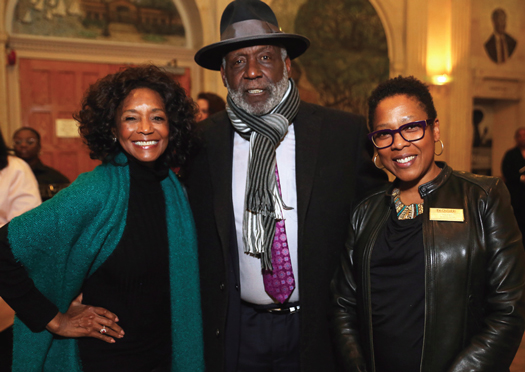Blacks Actors, Producers In Hollywood Say Hurdles Still High
By James G. Muhammad -Contributing Editor- | Last updated: Mar 22, 2016 - 11:52:11 AMWhat's your opinion on this article?

From left Margaret Avery, Richard Roundtree and DuSable Museum Chief Curator Leslie Guy. Photo: Courtesy of DuSable Museum
|
CHICAGO—In the movie “Shaft,” the lead character is a baaad … well, you know the rest.
But the actor who played the iconic character told an audience here that even John Shaft would have a difficult time navigating the hurdles of prejudice and racism that exist in Hollywood.
Richard Roundtree joined a host of other Black Hollywood actors, writers and producers March 11 in a conversation about “Race and the Media: Series 1” at the DuSable Museum on the city’s South Side. The event was the first in a series of gatherings the museum will host to discuss the current state of the performing arts and controversies of race and inclusion.
Mr. Roundtree said the difficulty for Blacks in Hollywood today is the White toll booth at the production door.
“Unless you are able to get your project produced and mounted it don’t mean a damn thing,” he said emphatically.
That sentiment was echoed from others on the panel that included actresses Dawnn Lewis and Margaret Avery, musician Najee, filmmaker D. Channsin Berry and screenwriter Rodney Barnes. The crowd of 200 leaned in on every word of what has become a common refrain in discussions about the racism that exists in the institutions throughout the country.
“We don’t have Black people in decision making positions,” said Ms. Avery, who earned an Oscar nomination for her character Shug in “The Color Purple.”
“White writers and producers write what they think we would say. They get it wrong most of the time. And they inflict in casting their prejudices,” she said, explaining that once she wasn’t cast as a lawyer because the producers didn’t think Whites in the South would believe a Black woman could be a lawyer.
“We don’t make judgements about the Holocaust so how do they make judgements about us,” she asked.
Mr. Barnes, a co-producer of the “Boondocks,” described Hollywood as a high-school cafeteria where if you don’t fit in at the table you’re excluded. He said he pitches different ideas to mostly White producers who try to change the concept into something they can relate to. If the process goes on long enough, “I don’t recognize the idea anymore,” he said.
“It’s difficult to be culturally specific as long as it’s filtered through White thought. Even though you’re seeing more Black faces, they don’t sound like Black people,” he said.
Ms. Lewis, known for her character Jaleesa on “A Different World,” was the most vocal on the panel, declaring that change will come in Hollywood when Blacks start withholding their financial support from programs that don’t properly reflect Black people.
She said projects get the green lit based on whether they will make money, adding that if she were White with the same talents she has today, she would have been offered a wider variety of character roles.
Black actors get called in for specific roles and age groups, and Hollywood too often goes to the same Black actors as if others didn’t exist, she said.
Channsin Berry took the entrepreneurial route to producing his documentaries. After studying the pioneering Black filmmaker Oscar Micheaux and Tyler Perry’s independent model, Mr. Berry said he took his documentary “Dark Girls” to venues on the road like a concert.
He used social media, marketing and networking to make the screenings an event and a movement. After getting 6 million hits on social media, the film made $125,000 the first weekend out, he said.
“I went out and talked to my people on social media and you guys started tweeting. The next thing I know I’m in Newark, in London, in Paris. I’m in Africa because of social media and what you have done. It was between us and our relationship,” he said.
Demonstrating the tough road actors have, Mr. Berry said he has paid a price to be a Black independent and Ms. Avery, who didn’t work for several years after “The Color Purple,” called on the Black community to raise its voice because “if we complain, we’re blackballed.”
Musician Najee has scored music for several films. He said Hollywood needs to “include more of the Diaspora of the human experience” and be more truthful. He expressed the irony of the movie “Gods of Egypt” featuring White lead actors.
Mr. Berry also called on the community to stop bootleggers and downloading content for free because such actions deprive artists of making a living and being able to produce new content.
“Nobody talks about the hard times in Hollywood because it’s not glamorous,” said Ms. Avery. “You have to be able to take rejection after rejection and have a strong relationship with God.”
Young actor Jason Jack Edwards, who appeared in commercials and the film “Black Dynamite,” attended the event to hear how to survive in the industry.
“I learned that I’ll have to stick to my convictions and passion for acting,” he said. “They’ve been knocked down. The industry is filled with rejection, but they all are very passionate about what they do.”
INSIDE STORIES AND REVIEWS
-
-
About Harriett ... and the Negro Hollywood Road Show
By Rabiah Muhammad, Guest Columnist » Full Story -
Skepticism greets Jay-Z, NFL talk of inspiring change
By Bryan 18X Crawford and Richard B. Muhammad The Final Call Newspaper @TheFinalCall » Full Story -
The painful problem of Black girls and suicide
By Charlene Muhammad -National Correspondent- » Full Story -
Exploitation of Innocence - Report: Perceptions, policies hurting Black girls
By Charlene Muhammad -National Correspondent- » Full Story -
Big Ballin: Big ideas fuel a father’s Big Baller Brand and brash business sense
By Bryan Crawford -Contributing Writer- » Full Story






 Click Here Stay Connected!
Click Here Stay Connected!








